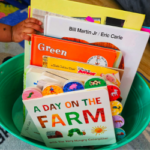12 Tips on How to Raise Grateful Children in an Entitled World
Raising grateful children is a top priority in our household. In fact, expressing gratitude is a part of our daily regimen. It has been from the time my children could talk.
We live in a world where kids have so much “stuff” and everything at their fingertips. This type of lifestyle not only provides instant gratification (which is not always a good thing) but can often lead to unhealthy behaviors like a sense of entitlement. When kids are entitled, they believe everyone owes them something, the world revolves around them, and they take the people and things in their lives for granted.
I have witnessed firsthand how disappointing it can be for parents to realize that they are raising ungrateful children. And the sad reality, which is oh so hard to come to terms with, is that our children are who we raised them to be.
Like everything else, children are not born knowing how to express and practice gratitude. It is something that they need to learn from their parents.

What are the benefits of raising grateful children?
Countless studies have shown that gratitude is imperative to a healthier life for everyone, from young children to adulthood. But here are a few reasons for wanting to instill gratitude into your child from a young age:
-
- Gratitude increases happiness: According to a 2019 study published in the Journal of Happiness, gratitude is linked to happiness in children by age 5. So yes, teaching your kids gratitude from an early age could help them to be happier humans.
- Grateful children ages 11 to 13 are more optimistic, have more social support, and give more social support to others. These kids also tend to be content with themselves, families, friends, schools, and overall communities.
- Grateful teens ages 14 to 19 tend to be more content with their lives.
- Grateful kids are more engaged in their schoolwork and hobbies.
- Grateful kids have better grades.
- Being grateful reduces depression, materialism, and jealousy.
- Grateful children are more hopeful and resilient in challenging times.
- Gratitude improves both physical and mental, and psychological health.
- People who are grateful sleep better
- Grateful also tend to live longer.
How to raise grateful children
1) Teach your kids to say please and thank you:
Since my children could talk, please and thank you have always been something I taught them to say whenever they make a request or someone shows them kindness. And as they get older, I explain why it’s important for them to say please and thank you each year using age-appropriate language they can understand.
For example: Now that my daughter is a little older, she adds a short explanation to highlight why she is thanking me or someone else. It’s not just “thank you” anymore; it’s “thank you, mom, for taking me to get ice cream.”
2) Talk about and explain gratitude to your kids:
Talking to your kids about gratitude, what it is, when, and how to express it is the beginning of teaching them how to be grateful. Teach them that gratitude is being thankful and showing appreciation to those who show kindness to them and add value to their life.
3) Model gratitude in your own life:
Education starts at home. Show your children how to express gratitude by acknowledging their efforts and showing recognition and appreciation to them for what they do, even the little things like helping a sibling with a task.
Related article:8 Simple Tips for Raising an Independent Child
4) Get your kids involved in household chores:
There are many benefits to getting your kids involved in household age-appropriate chores. Not only do chores expose your kids to tasks that will bring about the conversation of gratitude. But age-appropriate chores also make your kids feel like they are contributing to the family unit, which is good for their self-esteem and self-confidence.
And charity starts at home, right? If your child understands their role as a contributing member of the family, it is natural for them to want to get involved in their community.

5) Practice gratitude daily:
It’s easy to talk about gratitude and never put it into practice. Making gratitude part of your household’s daily routine is an excellent way to show your kids how important it is to implement this practice in their lives.
Every night my daughter and I say a prayer of gratitude to God, and we take turns.
6) Show your kids ways to express thankfulness:
There are many ways to express gratitude. Making a list with your child of how they can say thank you and express gratitude to someone who adds value to their life or shows them kindness is a great way to continue the conversation on gratitude and show your child how important the subject is.
Ways to show gratitude:
- Donate toys and clothing
- Perform acts of kindness regularly- Help out an elderly neighbor by raking their leaves or bringing them a casserole.
- Volunteer at your church, shelter, or food bank
- Teach your kids to share
- Use the holidays to express gratitude
- Normalize complimenting other people
- Write and make thank you cards for family and friends
7) Teach your kids to take the initiative:
Help your kids to understand that they don’t have to wait to be told to do something. If something needs to get done, take the initiative to get it done. For example, if they notice the recycling overflowing, empty it instead of waiting for mom and dad to tell them to take it out.
Related article: 7 Benefits of Using a Responsibility Chart for Kids (with age-appropriate chores)
8) Don’t spoil your kids:
Are you the type of parent who does everything for their kids or gives them whatever they want? If so, that needs to stop. If you are a parent who really wants to know how to raise grateful children, you might want to reconsider this parenting technique. Spoiling your kids can come with a sense of entitlement even outside the home.
9) Create a gratitude jar:
Create a family gratitude jar and read them out loud either at the end of every month or wait until Thanksgiving to read them at the dinner table!
10) Be happy for others:
This is a challenging task, even for adults. But teach your kids early to be satisfied with what they have and not be envious of other people.
11) Say “No” to your child:
Learn to say “no” to your child and stick to it. Nowadays, many parents are refusing to use the word “no,” but the reality is that your kids will hear the word “no” from other people if not from you. Teach them how to cope with being told they cannot get everything they want.
12) Teach kids about the less fortunate:
Your kids can’t live in a bubble forever. They will come across people who are less fortunate than they are. Get the conversation started and help them to understand why some people are in a different situation.
Final words on raising grateful children
As parents, if we are not intentional about how we raise our kids, we will end up with children who show no regard and appreciation for you and those who do so much for them. This is not only hurtful to us as parents but will make our kids’ adult lives much more challenging, as I have explained the many benefits of expressing gratitude in one’s daily life.













